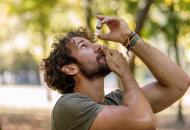It’s long been known that eating a healthy diet can reduce the risk of a slew of chronic conditions. And research suggests that making healthy food choices may even affect your mood.
Is there a best diet for depression? Certainly, a healthy, balanced diet can help. That means a diet rich in fruits and veggies, and low in foods such as processed meat, red meat, sweets and snacks, which cause inflammation (more on this below). This healthy type of diet may lower the risk of symptoms of depression.
But there’s no one-size-fits-all approach for everyone, says Jasdeep Sandhu, M.D. She’s a psychiatrist in Austin, Texas. What may work for one person may not be right for someone else.
Instead, Dr. Sandhu encourages patients to pay attention to how they feel after they eat certain foods. That way, they intuitively focus on foods that make them feel more stable, energized or content. They can also avoid foods that may make them feel down, sluggish or anxious.
Read on to learn more about what foods are best (and worst) for your mental health.
For more mental health support, including access to board-certified professionals, coaches and other resources, explore Mind Your Health™.
What are some foods that may help you feel happier?
Here are some of Dr. Sandhu’s food-related recommendations that may help boost your mood.
Eat more plant-based foods. Try to get many different fruits and vegetables into your diet, says Dr. Sandhu. Consuming a wide diversity of plant-based foods is key. This helps ensure that you have the right balance of good and bad bacteria in your gut, she explains. Why is this important? “It’s the good bacteria that may help to increase levels of brain chemicals that boost mood, like serotonin,” she says.
The goal is to eat 5 cup-size servings a day — as much as 2 cups of fruits and 3 cups of vegetables. The more you can pack in, the better. A 2023 British study, for example, found that people who consumed plenty of fruit reported better moods than those who just noshed on junk food.
Simple ways to add plant-based foods to your diet include:
- Adding spinach to your morning omelet
- Mixing a beet or a handful of kale into a smoothie
- Replacing carbohydrates, such and bread or French fries, with starchy vegetables, such as sweet potatoes or squash
Focus on fermented foods. Kimchi, sauerkraut and miso are not just savory — they’re also fermented. This means they provide beneficial bacteria such as lactobacillus for your gut, says Dr. Sandhu. Recent research shows that that type of bacteria may help boost levels of certain chemicals in your body. These chemicals may help you better respond to stress and prevent depression.
Dr. Sandhu also recommends eating yogurt and kefir, a fermented drink made with milk.
Feast on fish. When it comes to fish, Dr. Sandhu uses this acronym to remind people of healthier fish options that are high in omega 3s: SMASH. It stands for:
- Salmon
- Mackerel
- Anchovies
- Sardines
- Herring
A recent survey was conducted among college students. It found that those who ate fish once or twice a week were less likely to report being depressed than those who didn’t. Possible reasons for this benefit? These types of fish are rich in both vitamin D and omega-3 fatty acids. Vitamin D has been shown to help improve depressive symptoms. The same holds true for omega-3 fatty acids.
Talking with a mental health professional can help boost your mood, too. Explore your virtual mental health care options today, or call 1-844-211-7730 for more information.
What are some foods that may lead to you feeling depressed?
You might treat yourself to a fast-food meal when celebrating a happy event. But processed foods may have the opposite effect on your mood.
In fact, some of these foods may increase your risk of depression. These include highly processed foods and ones with many added ingredients, such as hot dogs or imitation meats, packaged cookies and sweets, and sugar-filled soft drinks.
People who ate at least 9 servings of these types of food daily were 50% more likely to develop depression. That’s compared to those who had 4 or fewer servings per day.
That’s because these types of foods are inflammatory, says Dr. Sandhu. They may also contain a lot of added sugar, which can muck up the bacteria in your gut, she says.
Inflammation is a normal part of how the body responds to injuries and invaders, such as germs and viruses. It not only promotes healing but also helps you feel better. However, inflammation that occurs when there’s no injury or invader present can harm healthy parts of the body and potentially even lead to chronic diseases.
What foods to avoid when taking antidepressants
Let’s say your primary care doctor diagnoses you with chronic depression, so you see a psychiatrist, and they prescribe you an antidepressant to help you feel better. Not all of the foods listed in this article may be good to eat when you’re taking antidepressants.
One type not listed above that you’ll want to avoid is alcohol. It may worsen symptoms of depression, says Dr. Sandhu. Alcohol may also increase the side effects of antidepressants, such as drowsiness.
And while an occasional cup of coffee with your breakfast may be all right, having 5 cups or more per day may not be. Drinking too much caffeine has been linked to anxiety. It may also cause panic attacks in people with panic disorders.
If you’re taking the type of antidepressant called monoamine oxidase inhibitors, or MAOIs, you may also need to take precautions. That’s because they can interact with certain foods like:
- Aged cheeses
- Fermented sausages
- Some cured meats, such as salami
- Soy sauce
This interaction could cause a sudden dangerous rise in blood pressure.
Can you overdose on antidepressants if you eat grapefruit?
Not exactly. Grapefruit is one food (or juice) that you need to be careful with when you’re taking antidepressants or antianxiety medications. That’s because it can interact with certain antidepressants, such as sertraline (Zoloft). And the interaction might feel or act like a drug overdose, in that it causes things like:
- Bleeding from the stomach or intestines
- Dangerous heart rhythms
- Kidney damage
- Muscle damage
- Respiratory depression
Grapefruit can also interact with many other medications. So, if you’re taking medications, be sure to check with your doctor or pharmacist before eating or drinking anything containing this fruit or fruit juice.
It’s important to remember that diet is just one factor in warding off or worsening depression. If you need help getting on the path toward a healthy diet, ask your doctor. They may be able to refer you to a dietitian, who can help you make better choices for your meals.
Even if you’re eating right but still feel down, it may be time to meet with a mental health professional. They can help you understand why you’re feeling this way. To get access to virtual mental health care, enter your zip code to see what options are available to you. You can also contact a licensed insurance agent at 1-844-211-7730.
This article contains information that is compiled by UnitedHealthcare or its subsidiaries. UnitedHealthcare does not represent all the information provided are statements of fact. Please consult directly with your primary care physician if you need medical advice.
Sources:
Brain, Behavior, and Immunity. “Lactobacillus from the altered Schaedler Flora maintain IFNγ homeostasis to promote behavioral stress resilience.” January 2024. Retrieved from https://pubmed.ncbi.nlm.nih.gov/37924959/
British Journal of Nutrition. “Frequency of fruit consumption and savoury snacking predict psychological health; selective mediation via cognitive failures.” February 2023. Retrieved from https://www.ncbi.nlm.nih.gov/pmc/articles/PMC9899573/
Centers for Disease Control and Prevention. “Adults meeting fruit and vegetable intake recommendations.” January 6, 2022. Retrieved from https://www.cdc.gov/mmwr/volumes/71/wr/mm7101a1.htm
Cleveland Clinic. “Inflammation.” March 22, 2024. Retrieved from https://my.clevelandclinic.org/health/symptoms/21660-inflammation
Cleveland Clinic. “MAOIs (monoamine oxidase inhibitors).” August 30, 2023. Retrieved from https://my.clevelandclinic.org/health/treatments/25220-maois-monoamine-oxidase-inhibitors
Cureus. “Association between dietary habits and depression: a systematic review.” December 2022. Retrieved from https://www.ncbi.nlm.nih.gov/pmc/articles/PMC9828042/
Current Nutrition Reports. “Is vitamin D important in anxiety or depression? What is the truth?” 2022. Retrieved from https://www.ncbi.nlm.nih.gov/pmc/articles/PMC9468237/
General Hospital Psychiatry. “Effects of caffeine on anxiety and panic attacks in patients with panic disorder: a systematic review and meta-analysis.” January–February 2022. Retrieved from https://pubmed.ncbi.nlm.nih.gov/34871964/.
JAMA Network Open. “Consumption of ultraprocessed food and risk of depression.” September 2023. Retrieved from https://www.ncbi.nlm.nih.gov/pmc/articles/PMC10512104/.
Journal of Personalized Medicine. “Omega-3 fatty acids supplementation in the treatment of depression: an observational study.” February 2023. Retrieved from https://www.ncbi.nlm.nih.gov/pmc/articles/PMC9962071/
Nutrients. “Effect of plant-based diets on gut microbiota: a systematic review of interventional studies.” March 2023. Retrieved from https://www.ncbi.nlm.nih.gov/pmc/articles/PMC10057430/
Nutrients. “Prevalence of depression and fish consumption among first year Spanish university students: UniHcos Project.” June 2023. Retrieved from https://www.ncbi.nlm.nih.gov/pmc/articles/PMC10300875/
Poison Control. “Grapefruit and medicines: Can they mix?” Retrieved from https://www.poison.org/articles/grapefruit-and-medicines Accessed April 9, 2024
UnitedHealthcare. “Find UnitedHealthcare doctors, dentists and providers.” Retrieved from https://www.uhc.com/find-a-doctor Accessed April 9, 2024
Compliance code:
50919-X-0424










